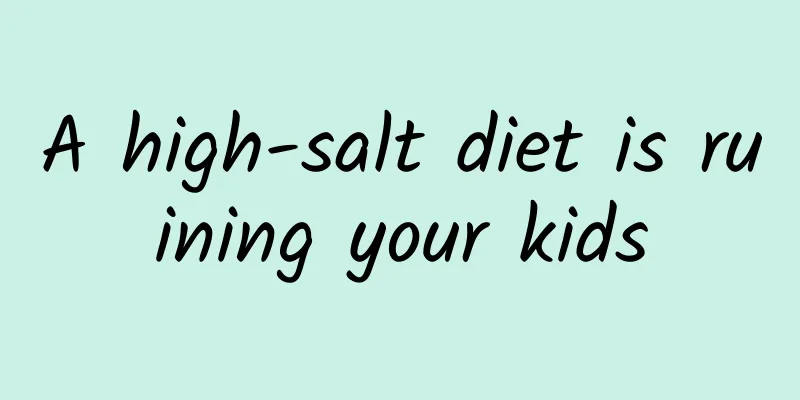A high-salt diet is ruining your kids

|
In recent years, strong-flavored food has become more and more popular, especially those with strong flavors, unique tastes, and certain stimulation, which can bring pleasure and satisfaction to our taste buds. This is true for adults and children alike. A grilled sausage with a fragrant oil and a cup of fragrant milk tea have become a standard after-school meal. However, excessive pursuit of strong flavors may have a negative impact on physical health, especially for children who are still growing and developing. They should be careful not to develop eating habits that are too strong. People pay more attention to sugar, but ignore salt When it comes to heavy tastes, salt, oil and sugar are indispensable. Long-term intake of high-salt, high-oil and high-sugar foods will increase the risk of a variety of diseases, so the "three reductions (reducing salt, reducing oil and reducing sugar)" are particularly important. However, people tend to pay more attention to sugar control and ignore salt control. The survey shows that 68% of consumers are willing to control sugar, and 58.1% of consumers will actively request less sugar or no sugar when ordering drinks, but when ordering meals, only 31.4% of consumers will actively ask merchants to use less salt. Little do people know that the situation of excessive salt intake among Chinese people is more serious. A high-salt diet is even more harmful to our health and that of our children than high oil and high sugar, and should be taken seriously. Chinese people generally consume too much salt, and northern China is the hardest hit Salt is the king of all flavors. In addition to giving food a salty taste, it can also enhance sweetness, improve umami, cover up metallic or chemical odors, and improve the overall flavor characteristics. The main component of salt is sodium chloride, which can maintain the body's osmotic pressure and acid-base balance, help the body maintain normal excitability of nerves and muscles, and maintain good health. Therefore, salt is an indispensable condiment in our lives. However, the dietary habits of Chinese residents have a high salt intake. The "Dietary Guidelines for Chinese Residents" recommends that people over 11 years old should not consume more than 5 grams of salt per day, but studies have found that my country's current salt intake is 9.3 grams/day, almost twice the recommended amount, while the salt intake in northern China is 16-18 grams/day, more than 3 times. Don't let high salt levels ruin your child's future A high-salt diet increases the risk of high blood pressure, and can also increase the risk of stroke, gastric cancer and all-cause mortality. Foreign research results show that the more frequently salt is added to food, the higher the risk of premature death and the shorter the life expectancy. For children and adolescents, a high-salt diet is also harmful, and the younger the age, the greater the harm. Salt is closely related to children's blood pressure. A high-salt diet will increase the risk of cardiovascular disease in children. Reducing children's salt intake can reduce the risk of high blood pressure and cardiovascular disease. A high-salt diet will also affect the absorption of zinc in children, affect the development of children's intelligence, and cause children's immunity to decline, thereby causing various diseases. The saltier you eat, the faster you gain weight When it comes to overweight and obesity, we often think of high oil and high sugar first. In fact, high salt can also lead to overweight and obesity, and is even no less than high oil and high sugar diets. Many studies at home and abroad have found that overweight and obesity are closely related to high salt intake, and higher salt intake increases the risk of obesity. Researchers believe that a high-salt diet leading to an increase in fasting growth hormone-releasing peptide in healthy people may be a pathogenesis of obesity. High salt intake can lead to an increase in endogenous fructose and phage production, and at the same time produce leptin resistance, leading to obesity. Therefore, for overweight and obese people, especially teenagers, in addition to controlling the intake of oil and sugar, they should also develop a light taste and reduce the amount of salt in food. Scientific salt reduction starts in the kitchen Studies have shown that more than half of the salt in Chinese people's diet comes from the kitchen, so reducing the use of salt in the family kitchen is crucial to controlling salt intake. However, in many families, when parents prepare meals for their children, they often decide the saltiness based on their own taste. In particular, the elderly with a stronger taste are more likely to let their children eat saltier food, which increases their salt intake. According to a research report published in the journal Nutrition, 79% of children aged 1-3, 87% of children aged 4-5, and 90% of children aged 6-18 in the United States consume too much salt every day. Data released by the Institute of Nutrition and Health of the Chinese Center for Disease Control and Prevention at the "National Report Conference on Research Results on Nutrition and Health of Chinese Children and Adolescents" also showed that the sodium intake of Chinese children and adolescents generally exceeded the standard, with an average of more than 2 times the recommended value. Recommended daily salt intake for children and adolescents So, how can we reduce salt intake scientifically? 1. Use 5%-10% less salt when cooking. Reducing cooking salt by 5%-10% usually does not have a significant impact on the taste of dishes, and helps people gradually adapt to and develop a light and low-salt diet. 2. Learn to use tools. Using salt-limiting spoons, low-sodium salt, reduced-salt soy sauce, etc. can help people control salt intake to a certain extent; but it is recommended that patients with kidney disease seek medical advice and should not blindly choose low-sodium salt. 3. Cleverly choose natural ingredients and seasonings to enhance flavor and freshness. Use onions, ginger, garlic, chili peppers, and peppercorns to enhance the flavor, and use sour substances such as lemon and vinegar to enhance the salty taste. It should be noted that chicken essence, monosodium glutamate, soy sauce, oyster sauce, sauces and other condiments contain high sodium, so they should be used in moderation and in a reasonable combination. 4. Be wary of “invisible salt”. When controlling salt intake, we should also pay attention to reducing the intake of "hidden salt". For example, noodles, bread, biscuits and other foods also contain salt, so we should pay attention to the overall intake. |
Recommend
Itchy white discharge
Gynecological diseases are particularly confusing...
How to treat vulvar leukoplakia effectively?
Vulvar leukoplakia is a very common gynecological...
Is ovarian clear cell cancer hereditary?
Among various types of cancer, one is called ovar...
Can I eat pineapple cakes during menstruation?
There are many taboos during menstruation, and it...
Female palm thenar blue picture
Whitening of the thenar eminence on a woman's...
When are gray dates picked? How to choose and buy gray dates
Gray dates are also called Xinzheng gray dates. T...
Why do girls like to bite boys?
In the process of falling in love, both men and w...
Sometimes there is a sharp pain in the uterus
A woman's uterus is very fragile. Some women ...
Why does a woman feel pain under her belly button?
Female friends must actively carry out disease pr...
There is a small itchy ball at the vaginal opening
The most common cause of a small lump growing at ...
Why does menstruation smell a bit bad?
Women have their periods for a few days every mon...
Do you know why your palms feel hot during menstruation?
Every month when the menstrual period comes, wome...









